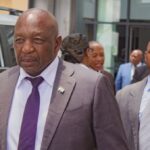The government has spent a staggering M528 million from the Contingencies Fund since the financial year began on April 1, 2025, and is now approving another M1,087,468 for the Deputy Prime Minister Nthomeng Majara’s upcoming trip to Brazil, funds meant strictly for emergencies.
A document from the Ministry of Finance and Development Planning, dated October 31, 2025, authorises an advance from the Contingencies Fund to cover Justice Majara’s participation in the 30th United Nations Climate Change Conference (COP30) in Brazil, where she is expected to represent Prime Minister Ntsokoane Matekane.
The document, signed by the Principal Secretary (PS) on October 30 and the Minister of Finance and Development Planning the following day, describes the trip as an “urgent and unforeseen” expenditure, the standard justification required under Section 114 of the Constitution of Lesotho, which governs the use of the Contingency Fund.
“Whereas it has become necessary in the interest of the Public Service to incur certain urgent and unforeseen expenditure not provided for in the estimates, authority to expend the amount specified in the schedule below is sought until such time as a supplementary estimate of the sum required can be laid before Parliament in terms of Section 114(2) of the Constitution,” the document reads.
“…Advance required: M1,087,468. Reasons: Additional funding is required to support the Deputy Prime Minister’s participation in the 30th UN Climate Change Conference (COP30) in Brazil, where the DPM will be representing the Prime Minister.”
But the facts tell a different story. COP30 has been on the global calendar for years. The United Nations Framework Convention on Climate Change (UNFCCC) confirmed Brazil as the host country, specifically Belém, Pará, on May 18, 2023.
The decision was publicly announced by Brazilian President Luiz Inácio Lula da Silva on May 26, 2023, during a press event in Brasília alongside Foreign Minister Mauro Vieira and Pará Governor Helder Barbalho.
It was later ratified by consensus at the COP28 plenary in Dubai on December 13, 2023.
In other words, this event is neither unforeseen nor urgent, and critics say calling it such is an abuse of constitutional safeguards designed for genuine emergencies such as natural disasters, pandemics, or national crises.
The Contingency Fund, created under Section 114(1) of the Constitution, allows the Minister of Finance to authorise expenditure “if satisfied that there has arisen an urgent and unforeseen need” for spending where no other provision exists.
However, the same section demands that every advance from the fund must be followed by a supplementary estimate and a supplementary appropriation bill, to be tabled in Parliament “as soon as possible” to replace the withdrawn amount.
That has not been done.
Section 114 explicitly states: “Parliament may make provision for the establishment of a Contingencies Fund and for authorising the Minister for the time being responsible for finance, if satisfied that there has arisen an urgent and unforeseen need for expenditure for which no other provision exists, to make advances from that Fund to meet that need.
“Where any advance is made from the Contingencies Fund, a supplementary estimate shall be presented and a supplementary Appropriation Bill shall be introduced as soon as possible for the purpose of replacing the amount so advanced.”
Despite hundreds of millions being spent, no supplementary appropriation bills have been presented to Parliament. This means Parliament, the body constitutionally entrusted with controlling public funds, has been completely bypassed, while the executive continues to raid the Contingency Fund unchecked.
According to the figures in the document, the Contingency Fund was allocated M955,684,354 for the 2025/26 financial year. Of that, M528,824,258 has already been spent, leaving M426,860,096 in the account.
This level of spending, just seven months into the financial year, suggests the government has turned the Contingency Fund into a slush fund, a financial backdoor to bankroll politically convenient or discretionary expenditures under the guise of “urgency.”
The pattern is becoming familiar. In the past, funds from the Contingency Fund have been used to finance ministerial trips, vehicles, and even celebrations, all under “urgent and unforeseen” pretences.
Each time, there is little to no follow-up from Parliament, and no transparency about how or when the amounts are reimbursed to the Fund.
Lesotho’s Constitution gives Parliament the power of the purse, but recent trends show that power slipping steadily into the hands of the executive, shielded by bureaucratic justifications and procedural silence.
In September this year, Newsday reported that the government had admitted to spending more than M3.4 billion without prior approval in the last financial year.
This publication further reported that the government was now asking parliament to retroactively legalise the expenditure.
This was after Finance and Development Planning Minister Dr Retšelisitsoe Matlanyane tabled the Supplementary Appropriation (2024/2025) Bill, 2025.
The Bill seeks approval for M3,452,226,578.44, already withdrawn from the Consolidated Fund, to cover unbudgeted recurrent and capital expenses for the 2024/2025 fiscal year.
According to the Bill, M539 million was advanced from the Contingencies Fund, which had initially been capitalised at M300 million and later topped up by M328 million through reallocation.
M1.18 billion was raised through Treasury Bonds to finance projects including the construction of the Petroleum Fund Headquarters, Lesotho Highlands Water Commission (LHWC) operations, subventions to the Lesotho Highlands Development Authority (LHDA) for ‘Muela Hydropower Works, Mohale access roads, the Oxbow Hydro II Project, settlement of government arrears, and a loan to the Lesotho Electricity Company (LEC) to pay Eskom.
M784 million was allocated under centralised items for salaries, arrears, youth and public works programmes, support for the Lesotho Millennium Development Agency (LMDA), official travel, and “critical initiatives” in agriculture, education, and security.
On the capital side, M180.9 million was shifted within the existing budget to prioritise key investments, while M65.1 million from the Contingencies Fund was used for electricity connections and road projects.
Donor disbursements worth M372.4 million, initially unbudgeted, were also channelled into development projects.
The decision to finance the Deputy Prime Minister’s trip through emergency funds also comes at a time when Lesotho faces worsening economic pressures: a drought-induced food crisis, rising unemployment, and struggling social services.
Observers warn that if Parliament continues to abdicate its oversight role, Lesotho could soon face a full-blown fiscal crisis, one where laws meant to protect public money are reduced to meaningless text.
For now, the Contingencies Fund, established as a safeguard against genuine emergencies, appears to be anything but.
Summary
- The document, signed by the Principal Secretary (PS) on October 30 and the Minister of Finance and Development Planning the following day, describes the trip as an “urgent and unforeseen” expenditure, the standard justification required under Section 114 of the Constitution of Lesotho, which governs the use of the Contingency Fund.
- “Whereas it has become necessary in the interest of the Public Service to incur certain urgent and unforeseen expenditure not provided for in the estimates, authority to expend the amount specified in the schedule below is sought until such time as a supplementary estimate of the sum required can be laid before Parliament in terms of Section 114(2) of the Constitution,” the document reads.
- “Parliament may make provision for the establishment of a Contingencies Fund and for authorising the Minister for the time being responsible for finance, if satisfied that there has arisen an urgent and unforeseen need for expenditure for which no other provision exists, to make advances from that Fund to meet that need.

Authored by our expert team of writers and editors, with thorough research.










